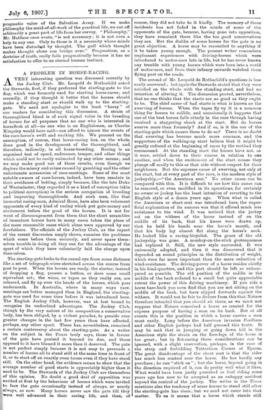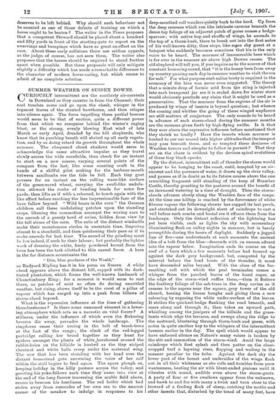A PROBLEM IN HORSE-RACING-.
AVERY interesting question was discussed recently by the Jockey Club. Mr. Leopold de Rothschild asked the Stewards, first, if they preferred the starting-gate to the flag, which was formerly used for starting horse-races; and secondly, if they thought it better that the horses should make a standing start or should walk up to the starting- gate. We need not apologise to the least " horsy " of our readers for considering this discussion. A strain of thoroughbred blood is of such signal value in the breeding of horses for all purposes that no one who is interested in horseflesh at all—no one who is an Englishman, as Charles Kingsley would have said—can afford to ignore the events of the race-horse's swift and exciting life. We proceed on the assumption, of course, that horse-racing has, on the whole, done good in the development of the thoroughbred, and therefore, indirectly, in all horse-breeding. Racing is an organised test of speed, endurance, temper, and other things which could not be easily estimated by any other means; and we may make good use of these results, even though we deplore the misery and crime caused by gambling and the other unfortunate accessories of race-meetings. Some of the most notable owners of race-horses, indeed, have been resolute in their avoidance of betting, simply because, like the late Duke of Westminster, they regarded it as a kind of corruption (akin to political corruption) in the serious occupation of breeding and improving thoroughbreds. And such men, like that immortal racing-man, Admiral Rous, have also been vehement opponents of every kind of racing which put gate-money and excitement before the good of the horses. It is not for want of discouragement from them that the short scrambles of immature horses have in many cases taken the place of the more reasonable races which alone were approved by our forefathers. The officials of the Jockey Club, as the report of the recent discussion amply shows, examine the problems which come before them seriously, and never spare them- selves trouble in doing all they can for the advantage of the sport of which they have voluntarily laid the charge upon themselves.
The starting-gate looks to the casual eye from some distance like a set of telegraph-wires stretched across the course from post to post. When the horses are ready, the starter, instead of dropping a flag, presses a, button, or does some small equivalent act; the wires, or tapes as they really are, are released, and fly up over the heads of the horses, which pass underneath. In Australia, where in many ways race- meetings are better managed than in England, the starting gate was used for some time before it was introduced here. The English Jockey Club, however, was at last bound to recognise its undoubted advantages. The Jockey Club, though by the very nature of its composition a conservative body, has been obliged, by a violent paradox, to preside over greater changes in the last few years than have affected, perhaps, any other sport. There has, nevertheless, remained a certain controversy about the starting-gate. As a writer on the subject in the Times truly says, those in favour of the gate have praised it beyond its due, and those opposed to it have blamed it more than it deserved. The gate is not perfect simply because it is not easy to persuade a number of horses all to stand still at the same time in front of it., or to start off on exactly even terms even if they have stood still. On the other hand, the evidence seems to show that the average number of good starts is appreciably higher than it used to be. The Stewards of the Jockey Club are themselves - of this opinion. No doubt a good deal of opposition was - excited at first by the behaviour of horses which were invited to face the gate occasionally instead of always, or nearly
ways, as now. Many horses never saw the gate till they ere well advanced in their racing life, and then, of
course, they did not take to it kindly. The memory of those incidents has not faded in the minds of some of the opponents of the gate, because, having gone into opposition, they have remained there like the too good conservatives they are. But the dislike of some horses for the gate is no great objection. A horse may be reconciled to anything if it be taken young enough. The present writer remembers unpleasant experiences with driving-horses which were introduced to motor-cars late in life, but he has never known any trouble with young horses which were born into a world of motor-cars, and from their infancy onwards watched them flying past on the roads.
The second of Mr. Leopold de Rothschild's questions is less easily answered ; but again the Stewards stated that they were satisfied on the whole with the standing start, and had no intention of altering it. The discussion proved, nevertheless, that no one thinks that the starts are as good as they ought to be. The chief cause of bad starts is what is known as the swerving of horses. When the tapes fly up it is a common thing for horses to collide, and occasionally it happens that one of the best horses fails utterly in the race through having received a staggering shock at the start. But do horses swerve more than formerly? And if so, is it the use of the starting-gate which causes them to do so ? There is no doubt that swerving has become much more common, and the supporters of the walking-up start believe that it might be greatly reduced at the beginning of races by the method they recommend. At the standing start the horses have not, as it were, settled down to their course in relation to one another, and when the excitement of the start comes they plunge off madly to this or that side without respect for their neighbours. But the supreme cause of swerving, not only at the start, but at every part of the race, is the modern style of jockeyship,—" the American seat." No other cause can be compared with this. It is difficult to see how this cause can be removed, or even modified in its operations, for certainly no owner or jockey has the least intention of reverting to the English style of a dozen years ago. When what is called the American or short seat was introduced here, the super- ficial explanation of its success was that it offered much less resistance to the wind. It was noticed that the jockey sat on the withers of the horse instead of on the middle of its back, that his knees were drawn up, that he held his hands near the horse's mouth, and that his body lay almost flat along the horse's neck. He looked like a racing-bicyclist. The grace of the old jockeyship was gone. A monkey-on-the-stick grotesqueness had replaced it. Still, the new style succeeded. It was universally adopted, and then it was discovered that it depended on sound principles in the distribution of weight, which were far more important than the mere reduction of wind-resistance. The driving-power of a horse resides chiefly in his hind-quarters, and this part should be left as unham- pered as possible. The old position of the saddle in the middle of the back reduced to a small but quite appreciable extent the power of this driving machinery. If you ride a horse bare-back you soon find that you are not sitting on the middle of the back, but have slipped forwards against the withers. It would not be fair to deduce from this that Nature therefore intended that you should sit there, as we mu3t not suppose that Nature conceived a horse as created for the express purpose of having a man on its back. But at all events this is the position in which a horse carries a man most easily. Long before the American invasion Fordham and other English jockeys had half guessed this truth. It may be said that in jumping or going down bill in the American style the strain on the fore-legs of the horse is too great ; but in flat-racing these considerations can be ignored, with a slight reservation, perhaps, in the case of the steep and forbidding Tottenham Corner at Epsom. The great disadvantage of the short seat is that the rider has much less control over the horse. He has hardly any purchase ; he can "stick on" ; but the horse, beyond going in the direction required of it, can do pretty well what it likes. What would have been justly punished as foul riding some years ago has now to be accepted as an unhappy accident beyond the control of the jockey. The writer in the Times mentions also the tendency of some horses to stand still after the starting-gate has risen ; but we need not enter into that matter. To us it seems that a horse which stands still
deserves to be left behind. Why should such behaviour not be counted as one of those defects of training on which a horse ought to be beaten ? The writer in the Times proposes that a competent Steward should be placed about a hundred and fifty yards in front of the starting-gate to report on the ewervings and bumpings which have so great an effect on the race. About these early collisions there are seldom appeals, as the judge, of course, has not seen them. The writer also proposes that the horses should be required to stand further apart when possible. But these proposals will only mitigate slightly a difficulty which has made a remarkable difference to the character of modern horse-racing, but which seems to admit of no complete solution.















































 Previous page
Previous page